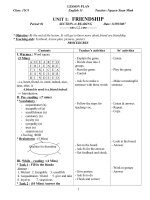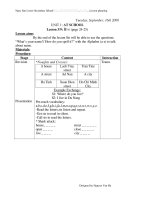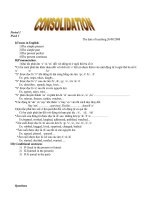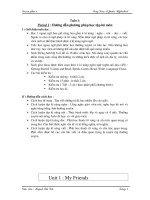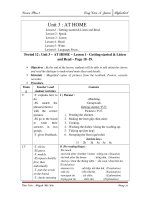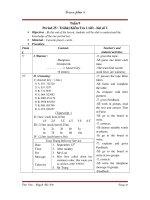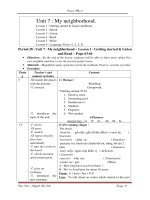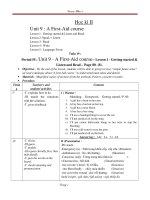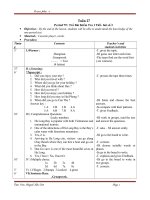Leson plan Grade 8
Bạn đang xem bản rút gọn của tài liệu. Xem và tải ngay bản đầy đủ của tài liệu tại đây (516.76 KB, 101 trang )
UNIT 7: MY NEIGHBORHOOD
Lesson 4: - Section: - Read (page 67,68)
Period 43
Aim:
Reading for details about Tran Phu Shopping Mall.
Objective:
By the end of the lesson, students will be able to understand the passage about
a new shopping. Mall.
Teaching aids:
Text book.
PROCEDURE
Stage Steps/Activities
Work
arrangement
Warm up
Pre-
reading
* Guessing the words (Revision):
- Give the definitions and get students to find out
the words as quickly as possible.
1. A place where you can buy everything.
(Supermarket)
2. A place where you can buy vegetables and
fruit.
(Grocery store)
3. A place where you can buy books.
(Bookstore)
4. A place where you can come to eat.
(restaurant)
5. A place where you can come to see the
movies
(Movie Theater).
6. A person who comes to the store and buys
something.
(customer)
- Give students good marks if they have
correct answers.
I. Pre - teach vocabulary
- a roof (picture)
- convenient (translation)
- a selection (explanation: a process of choosing
carefully).
T-whole class
T-whole class
- Available (translation)
- A mall (Synonym: many stores, restaurants even
movies theaters are under one roof)
- A resident (translation)
While
reading
* Checking vocabulary: What and where
- Get students to repeat the words in chorus when
the teacher points to the words.
- Rub out word by word but leave the circles.
- Go on until the circles are empty.
- Get students to write the words again in correct
circles.
II. Brains terming
- Set the scene: In Nam's neighborhood, there is
a new shopping mall.
- Ask students to think about the convenience of
the mall.
customers don't care of shop in comfort
the weather
* possible answers:
- wide selection of goods.
- Lower prices
- Buy many things at the same time
- Have fun or relax while shopping.
- Ask students to read the text silently and
compare their ideas or get more information.
- Give feedback.
- True / False statements:
- Have students look at the statements in the
exercise 1 page 68.
- Make sure they understand the statements.
Whole class
Whole class
- Get them to read the text again and decide
which statements are true, which are false.
* Answers:
True False
a. A mall is open six days a week.
b. There are more than 50 stores in the
mall.
c. Everyone in the neighborhood is pleased
about the new mall.
d. It will be more comfortable to shop in
Pair work
Roof
Convenien
t f
selection
Available
residen
t
comfortabl
e
The convenience
of the new shopping
mall
Post
reading
the mall than in the present shopping
area.
e. Some of the stores on Tran Phu Street may
have to close.
- Have students correct false statements
a. The mall is open daily.
b. There are 50 stores in the mall.
c. Not everyone is pleased. The owner of the
small stores on Tran Phu Street are not happy.
III. Comprehension questions
- Ask students to work in pairs to answer the
questions in the exercise 2 on page 68.
* Answers:
a. It is different from the present shopping area.
All the shops are under one roof. So customers
will shop in comfort and won't notice the
weather, especially during the hot and humid
summer months.
b. There are 50 air conditioned specialty stores,
4 movie theaters and 10 restaurants. There is
also a children's play area.
c. They think the mall will take their business.
d. The stores in the mall will offer a wider
selection of products, some goods are at lower
prices.
- Ask some students to ask and answer the
questions.
- Get all students to work in pairs.
* Discussion:
- Give a situation and ask students to discuss it.
"Do you want to have a new mall in your
neighborhood? If there is one, what will happen
Pair work
Pair work
Group work
Homework
to the residents?"
- Ask students to write the meanings of these
phrases into their notebooks.
• • under one roof
• • shop in comfort
• • take their business
• • offer a wider selection
• • specialty stores
• • have been concerned about
Group work
UNIT 7: MY NEIGHBORHOOD
Lesson 5: Section: - Write (page 68)
Period 44 - Language Focus (page 71)
Aim:
Helping students to write a notice and make comparisons by using adjectives:
like, the same as, different from.
Objective:
By the end of the lesson, students will be able to write a notice and to use some
adjectives to make comparisons.
Teaching aids:
Text book, 10 cards for Pelmanism, books and dictionary.
PROCEDURE
Stage Steps/Activities Work
arrangement
Warm up * Pelmanism:
- Prepare 10 cards with number (from 1 to 10) on
one side and 10 adjectives with their opposites on
the other.
- Stick 10 cards on the board so students can only
see the numbers.
- Divide class into 2 teams and ask them to choose 2
numbers, turn the cards over, if they match eg:
cheap - expensive, that team gets one mark. The
next team continues.
- Go on until all cards are turned over. The team
which has more marks the games.
Different cheap expensive long same
modern short big small
Group work
Presentation
Practice
- Show students 3 books, a red book and a yellow
one which have the same size and a bigger brown
dictionary then ask students to make comparisons.
* Possible answers:
• The red book is the same as the yellow one.
• The red book is as big as the yellow book.
• The yellow book is different from the brown
dictionary.
- Write the form on the board.
The same as…
(not) as… as
different from
- Ask students to do the exercise 5 on page 70-71
(work in pairs)
* Answers:
T-whole class
Pre-
writing
a. not as big as e. not as big as
b. different from f. the same as
c. different from g. as long as
d. the same as h. not as modern as
i. not as cheap as
- Set the scene: “The residents and store owners on
Tran Phu Street are going to hold a meeting to
discuss the effects of the new mall”.
- Get students to read the notice and answer some
questions to check their understading.
* Questions:
a. Why are the residents and store owners on Tran
Phu Street going to hold a meeting?
b. When will they hold a meeting? What time?
c. Where will they hold the metting?
* Answers:
a. To discuss the effects of the new hall.
b. They will hold the meeting on May 20 at 8 p.m.
c. They will hold the meeting at 12 Hang Dao
Street, Binh’s hardware store.
- Let students know the way to write a notice, not
write full sentences.
- Ask students to read passage 2 on page 68.
T-whole class
While
writing
Post-
writing
- Ask some questions to check students’
understanding and get them to use short answers.
a. What is the English Speaking Club going to hold?
(a Speaking Contest)
b. Where and when will it be held?
(At hall 204 on November 15
th
)
c.What time?
(From 7.30pm to 10.00pm)
d. Who is the person to contact?
(Tran Thi Thu Hang of class 8H)
- Get students to write the notice individually
- Monitor and help them write
- Ask students to share with their partners.
- Check some notices and correct them.
- Write the model notice on the board (Elicit student
to write).
* Answer:
The School English Speaking club.
HOLDING A SPEAKING CONTEST TO
CELEBRATE TEACHER’S DAY
Individual
work
Pair work
T-whole class
Homework
Date: November 15
Time: 7.30pm. to 10.00pm.
Place: Hall 204, Building G
Please contact Ms.Tran Thi Thu Hang of Class 8H
at the above address for more information.
- Ask students to do exercise 3 on page 68.
UNIT 7 : MY NEIGHBORHOOD
Lesson 6: Section: - Language Focus (page 69,70)
Period 45 1-2-3-4
Aim:
Practice in Present Perfect Tense.
Objective:
By the end of the lesson, students will be able to use Present Perfect Tense.
Teaching aids:
Text book, poster, cards
PROCEDURE
Stage Steps/Activities Work
arrangement
Warm up * Matching:
- Stick a poster of infinitives and Past Participles on
the board.
- Divide the class into 2 teams.
- Get students from 2 teams to go to the board and
write each pair of infinitive - past participle
Eg.: be - been
The team which writes more pairs wins the game
be see collected go worked
lived do seen eat attended
write been written eaten work
attend done live collect gone
* Answers
be - been write - written
go - gone live - lived
see - seen collect - collected
do - done attend - attended
eat – eaten work – worked
- Get students to repeat in chorus and remember
the past participles of irregular verbs .
Group work
Whole class
Presentation
- Set the scene: Na is new in Nam's neighborhood.
They are talking to each other.
- Give students an open dialogue between Nam
and Na then ask them to complete it.
Na: How long (1) you (2) in this neighborhood?
Nam: I (3) (4) here (5) 10 years.
Na: Really. It's a long time.
* Answers:
(1) have (3) have (5)have
(2)lived (4) lived
- Ask students to repeat the dialogue and ask some
students to practice in pairs.
• •Form: have/has + past Participle
• •Use: to talk about something which started in the
past and continues up to the present.
• We often use "For" and "Since" with the Present
Perfect Tense
Pair work
Practice
For + length of time
Since + starting point
1. Drill 1: Substitution Drill
- Ask students to look at exercise 2 on page 69 and
decide which is the length of time and which is
starting point.
- T reads out a phrase, students add Since or For
Ex: T : five minutes
Ss : for five minutes
- Go on until students can remember how to use
For /Since.
* Answers:
•• For five minutes
•• Since 1990
•• Since the summer
•• For three hours
•• For 10 weeks
•• Since Friday
•• For 20 years
2. Drill 2:
- Give the cues written on cards and ask students to
make Ml sentences, T corrects their pronunciation.
a. I /live/here/last week.
1 have lived here since last week.
b. We / not eat / in that restaurant/2 years
We haven't eaten in that restaurant for 2
years.
Individual
work
Production
c. I / not see / her / yesterday.
I haven't seen her since yesterday.
d. They / attend / Quang Trung School /last year
They have attended Quang Trung School since
last year.
e. My Dad / work / for his Company / 20 years
My Dad has worked for his Company for 20
years.
f. Ba / collect /stamp/1995
Ba has collected stamps since 1995.
- Ask students to do exercise 4 on page 70 (in
pairs) Pair work
Homework
- Give feedback.
* Answers:
(1) have been
(2) hope
(3) have...lived
(4) is
(5) want
(6) look
(7) have ...been
(8) have seen
- Get students to work in pairs to practice the
conversation between Ba and Tom
- Ask students to do exercise 3 (page 69) on their
notebooks.
Pair work
UNIT 8: COUNTRY LIFE AND CITY LIFE
I. Aim
Helping students:
- to talk about differences.
- to talk about future events and changes.
- to write a letter to a friend.
II. Language focus
1. Present Progressive
••To talk about the future.
••To describe changes with get and become.
2. Comparative and Superlative adjective.
III. Vocabulary
Verbs Nouns Adjectives
(to) face a drought nature accessible plentiful
(to) prefer
(to) struggle
a facility
a flood
a migrant
strain
a tragedy
typhoon
adequate
peaceful
Permanently (adv)
rural
urban
Lesson 1
Getting started
Listen and read
Reading for details about the differences
between the city and country life.
Lesson 2
Speak
Language Focus 3
Speaking about the changes, using the Present
Progressive Tense with Get and Become.
Lesson 3
Listen
Language Focus 1-2
Listeng for details and Further Practice in
Present Progressive Tense.
Lesson 4
Read Reading the text for details about the problems
of farmers moving to the city.
Lesson 5
Write Writing a letter to a friend about their
neighborhood.
Lesson 6
Language Focus 4-5 Further Practice in Comparative and
Superlative adjectives.
UNIT 8: COUNTRY LIFE AND CITY LIFE
Lesson 1: Section: - Getting started (page 72)
Period 46 - Listen and read (page 72,73)
Aim:
Reading for details about the differences between city life and country life.
Objective:
By the end of the lesson, students will be able to talk about the city life and the
country life.
Teaching aids:
Text book.
PROCEDURE
Stage Steps/Activities Work
arrangeme
nt
Warm up
Pre-
reading
* Chatting:
- Talk to students about life in the city and life in the
country by asking some questions.
a. Where do you live?
b. Do you want to live in the city ? Why?
c. Do you want to live in the country? Why?
I. Pre - teach vocabulary
T-Whole
class
- a relative (example: uncles, aunts, cousins) T-whole
While
reading
- peaceful (synonym: the synonym of quiet and calm).
- permanently (adv.) (explanation: its means existing
all the time)
- Accessible (translation)
- Medical facilities (translation)
* Checking vocabulary : Rub out and remember.
II. Brainstorming (getting started)
- Get students to talk about city life and country life.
The words in the box of getting started may help
them.
noisy quiet
* Possible answers:
- tall buildings
- plenty kinds of goods
- polluted air
- traffic jams
- entertainment
- busy
- beautiful views
- fresh food
- fresh air
- friendly
- peaceful
- Ask students to read the dialogue between Na and
Hoi and compare their ideas.
- Give feedback and get more information.
1. Comprehension Questions
- Get students to work in pairs to answer the questions
in exercise 2 on page 73.
* Questions and answers:
a. Where has Na been?
Na has been to Kim Lien Village.
b. How long was she there?
She was there for the weekend.
c. What is her opinion of the countryside?
To her, the country aide is peaceful and quiet and
there is nothing to do.
d. Na says "there is nothing to do", what does she
mean by this?
class
Pair work
There is no libraries, no movies, no supermarkets,
no zoos...
e. What are some of the changes that Hoa mentions?
Country life is becoming better. Many remote area
are getting electricity. People can now have things
like refrigerators and TV, medical facilities are
more accessible.
city life
country life
Post
reading
Production
- Ask students to work in pairs to answer the questions.
- Ask some pairs to practice the dialogue.
2. Discussion
- Divide the class into 4 groups. Two groups include
students who prefer the dty life and the others
include students who prefer the country life.
- Ask students to work in groups to answer the
questions.
Do you prefer the dty or the country life? Why?
1. Speaking 1:
- Ask students to look at the two pictures oil page 73
and talk to their partners about the changes of the
town. The words in the box under the pictures may
help students.
- Write the word prompts on the board so that students
can speak easily.
Eg:
traffic busy
sky cloudy
houses high
city beautiful
trees green (trees)
- Get students to work in pairs.
- Monitor and help students speak.
* Possible answers:
• The traffic is getting busier.
• There are more tall buildings and houses.
• The houses are getting more modern.
• The town is becoming more beautiful.
• There are more green trees.
• The streets are becoming cleaner larger / noisier
• Goods are getting more expensive.
Pair work
Group work
Pair work
Homework
2. Speaking 2:
- Ask students to work in groups and talk about
changes in their hometown/ neighborhood.
- Call on volunteer from each group to show their
ideas before the class. Other groups can add in their
ideas.
- Ask students to write some sentences, using Present
Progressive Tense to describe changes in their
school.
Group work
Individual
work
UNIT 8: COUNTRY LIFE AND CITY LIFE
Lesson 3: Section: - Listen (page 74)
- Language Focus 1-2 (page 77, 78)
Aim:
Listening for details to complete the dialogue and Further Practice in Present
Progressive Tense.
Objective:
By the end of the lesson, students will be able to complete the dialogue by
listening and Further Practice in Present Continuous to talk about the future,
Teaching aids:
Text book, cards.
PROCEDURE
Stage Steps/Activities Work
arrangement
Warm up
* Matching:
- Prepare eight cards with phrases on them.
- Write eight verbs on the board (play, do, watch,
go, clean, have, phone, speak).
- Divide the class into 2 teams.
- Hand out each team 8 cards.
- Ask students to stick the cards with phrases besides
the suitable verbs: Eg: play-table tennis.
- The team which is faster is the winner.
* Answers:
play table tennis
do my homework
watch a program
go to violin lesson clean
Group work
Pre-
listening
clean the house
have a meeting
phone my aunt, Mrs. Hang
speak to Mom
- Ask students to use the suitable verbs in the Present
Progressive Tense to complete the dialogue in the
exercise 2 page 78.
- Get students to work in pairs.
- Call some pairs to practice the dialogues before
class and teacher corrects.
* Answers:
a. am playing b. are doing
c. am watching d. am going
e. are cleaning f. am having
* Concept checking:
Pair work
T-Whole class
While
listening
• What tense do we use in 6 dialogues?
(Present Progressive Tense )
• What is the form? (am / is / are + V-ing)
Look at the adverbs of time in the dialogue. Are
they at present or in the future?
(in the future)
• Present Progressive Tense is used to talk about the
future.
- Set the scene: "Aunt Hang is talking to Lan on the
phone. She is coming to visit Lan in Hanoi".
- Ask students to listen to the tape and complete the
dialogue on page 74.
- Let students listen twice and find out the missing
words individually.
- Ask students to share their answers with their
partners.
* Tape transcript:
Lan: Hello.
Aunt Hang: Hello. Is that Lan?
Lan: Yes. Who is this?
Aunt Hang: It's Aunt Hang. How are you?
Lan: I'm fine. Where are you phoning
from?
Aunt Hang: Hue. I'm calling to tell you uncle
Chiand I are coming to visit you next week.
Individual
work
Pair work
Post-
listening
Lan: Great! When are you arriving?
Aunt Hang: On Thursday. We're arriving in Hanoi
in the late afternoon.
Lan: OK. Do you want to speak to my
Mom?
Aunt Hang: Yes, please.
Lan: Hold on a moment and I'll get her.
- Ask students to (Jo exercise 1 on page 77
- Call on some students to practice the dialogues on
page 77.
- Give them the shipping information and ask them to
make similar dialogues.
Eg l:
Si: Is the boat to Qui Nhon leaving at 11.30?
S2: Is that good fortune?
S1: That's right.
S2: I'm very sorry. It's been delayed.
S1: Oh no!
S2: Now, it's leaving at 13.55
Pair work
Pair work
Homework
Eg 2:
S1: Is the boat from Camau arriving at 11.00.
S2: Are you talking about Diamond Eyes?
S1: Yes.
S2: It's arriving on time.
- Ask students to write 5 sentences, using Present
Progressive Tense about what they are doing next
week.
UNIT 8: COUNTRY LIFE AND CITY LIFE
Lesson 4: Section: - Read (page 75)
Period 49
Aim:
Reading Comprehension about the problemof people from countryside moving
to the city.
Objective:
By the end of the lesson, students will be able to understand the text about one
of the social problems.
Teaching aids: Text book, poster.
Stage Steps/Activities
Work
arrangement
Warm up
Pre-
reading
* Jumbled Word*:
- Write the words with disordered letters on the board
(or use the poster)
• Fulentipl →
• Taneru →
• Loofd →
• Roestdy →
• Laputipoon →
• suertl →
• ciliestiaf →
plentiful
nature
flood
destroy
population
result
facilities
- Divide the class into 2 teams.
- Ask students from each team to go to the board and
write the correct words.
- The team which is faster with more correct words
wwords wins the game.
I. Pre - teach vocabulary
- rural (adj.) (explanation: something deals with the
countryside)
- urban (adj.): (antonym)
- (a) stain: (translation)
Group work
T-whole
class
- (a) typhoon: (synonym)
- (a) drought (explanation: hot and dry weather
for a long time)
- (to) struggle (translation)
- (a) migrant (explanation: a person who moves
from one place to another especially in order to
find work)
- (to) increase (translation)
* checking vocabulary: what and where.
II. Brainstorming
- Ask students to think of the difficulties of farmers'
life. Typhoons
Floods get little money
Whole class
While
reading
* Possible answers:
- Droughts
- the weather
- hard work
- no vacations
- lack of dean water/ electricity
- insects destroy harvests
- Ask the students to guess how farmers deal with
difficulties.
- Get students to work in groups to guess. .
- Let students read the text silefftly and answer the
questions : "What do many farmers do to solve
their prolem?"
* Answer: They move to the city so that they can get
well - paid jobs.
III. Gap - filling
- Ask students to work in pairs to complete summary
1 on page 75, using the information from the
passage.
* Answers:
"People from the countryside are leaving their
home to go and live in the city. Farming can
sometimes be a difficult life and these people from
rural areas feel the city offers more opportunities.
However, many people coming to the city create
problems. There may not be enough schools or
hospitals, while water and electricity supplies may
Pair work
Difficulties of
farmers’ life
not be adequate. This is a problem lacing
governments around the world."
IV. Finding the words
- Ask students to do exerci&e 2 on page 75.
- Let them read the text again and work with their
partners.
* Answers:
a. of the countryside → rural
b. as many as needed → plentiful
c. become greater or larger → increase
d. a great pressure → strain
e. a terrible event → tragedy
f. of the city or city life → urban
Pair work
Post -
reading
Homework
* Discussion:
- Give a situation: If you wer a Minister, what would
you do for farmers?"
- Ask students to work in groups and discuss.
* Possible answers:
• • Build streets, theaters, stadium in the country.
• • Build schools, hospitals
• • Provide clean, water, electricity, facilities
• • Build factory.
• ........................................................................
- Ask 4 volunteers from 4 groups to show their ideas
before the class.
- Ask students to write 5 things that the government
should do for the rural areas.
Group work
UNIT 8: COUNTRY LIFE AND CJTY LIFE
Lesson 5: Section: - Write (page 76)
Period 50
Aim:
Writing letters to friends about the neighborhood.
Objective:
By the end of the lesson, students will be able to write letters to their friends
about their neighborhood.
Teaching aids:
Text book, cards.
PROCEDURE
Stage Steps/Activities
Work
arrangement
Warm up * Revision:
- Ask students to put the, outline for an informal letter
Whole class
in the correct order.
- Prepare 6 cards with 6 outlines on them.
- Call six students to hold them and stand in a random
order.
- Ask some other students to rearrange them in the
correct order.
- Write the answer on the board so that students can
remember the outline of a letter.
1. Heading
Pre-
writing
• •Writer's address.
• •Date
• •Dear.....,.,,,,
2. Opening
3. Body of letter
4. Closing
* Answer questions:
- Ask students to work in pairs to answer the
questions in exercise 2 on page 76.
- Give feedback
a. Where do you live?
(I live in a small town / big city / village)
b. What does your house look like?
(My house looks very nice / small with 4/5 rooms
and a nice/ small garden)
c. What can you see front your bedroom
window? . ' '
(From my bedroom window, I can see a
small park with many green trees and
colorful flowers.)
d. How far is it from your hpme to school?
(It's far from my home so I have to ride my bike /
It's very near so I can walk.)
e. What kinds of facilities are there in your
neighborhood?
(There is a park / a swimming pool/ some
restaurants, a post office / ft library.)
f. What things in your neighborhood do you
like best? Why?
(I like the park best because I can walk with my
sisters after dinner/ every morning / I like the
library best because I can read many interesting
books, or study or learn how to uee the computer
there.)
- Ask students to write letters to friends about their
While
writing
neighborhood.
- Let them write individually.
- Ask them to compare with their partners and
correct if they can.
- Suggested letter:
Individual
work
Pair work
Post
writing
Homework
(Writer’s address)
(date)
Dear.......
I live in ...... a small town. My family has a large
house with four rooms and a small garden. My sister
and I share one bedroom. From the bedroom window,
I can see a beautiful park with green trees, flowers
and a pood. We don't live far from my school so I
usually walk there.
In my neighborhood, there is a swimming pool and a
beautiful park. On the weekend, I often go swimming
with my friends. Early in the morning, I always jog
with my sister around the park. But the thing I like
best in my neighborhood is the public library near my
school. There I not only can study and read books but
also watch video and learn how to use the computer.
Do you have a library like that in your neighborhood?
Is there anything interesting in the place where you
live? Write to me.
I'd like to say goodbye now. I'm looking forwards to
hearing from you soon.
Love,
(Signature)
* Correction:
- Choose some letters to correct before class (using
projector if possible)
- Ask students to write their letter (after correction)
on their notebooks.
T-Whole
class
UNIT 8: COUNTRY LIFE AND CITY LIFE
Lesson 6: Section: - Language Focus 4-5 (page 79)
Period 51
Aim:
Further Practice in comparative and superlative adjectives
Objective:
By the end of the lesson, students will be able to use comparative and
superlative adjectives.
Teaching aids:Book, red and yellow chalk.
PROCEDURE
Stage Steps/Activities Work
arrangement
Warm up
Presentation
Practice
* Brainstorming:
- Ask students to find out short adjectives and long
adjectives they have learnt.
- Divide the class into 2 teams, one using yellow
chalk and the other red chalk.
- Get students to go to the blackboard and write the
adjectives.
expensive big
* Answers:
- accessible
- beautiful
- convenient
- difficult
- intelligent
- comfortable
- delicious
- interesting
- busy
- easy
- cheap
- good irregular
- bad adjectives
- poor
- fresh
- small
- Remind students of the forms of comparative
and superlative adjectives.
• Comparative:
Short adjective - ER + than + object
More long adjective + than + object
• Superlative:
The + short adjective - EST
The MOST + long adjective
• Irregular adjectives:
good/well - better - the best
bad - worse - the worst
many - more - the most
little - less - the least
- Ask students to do exercise 4 on page 79. They
have to work in pairs to make comparisons
between the city and the country about: food,
Group work
Whole class
Pair work
traffic, transport, air, entertainment, medical
facilities, schools, electricity with the adjectives;
easy, expensive, cheap, good, bad, poor, big,
Long
adjectives
short
adjectives
Production
accessible, fresh.
- Give some examples.
a. The air in the country is fresher than in the city.
b.The medical facilities in the city are more
accessible; than in the country.
- Move around the class and help the students write
comparison sentences.
- Let each student read aloud one of the sentences
they have made.
* Possible answers:
a. The food in the city is more expensive than in
the country.
b. The school in the city is bigger than in the
country.
c. Electricity in the city is better than in the
country.
d. The entertainment in the country is poorer than
in the city.
e. The traffic in the city is busier than in the
country.
f. The transport in the country is worse than in the
city.
g. .....................................................................
- Let students make any sentence they want, only
focus on the structures, not on the meaning.
- Ask students to dp exercise 5 on page 79.
- Ask them read the advertisement then ask them
some questions to check their understanding.
• What are advertised?
(an apartment, a villa and a house)
• How old are they?
(The apartment is 2 years old, the villa is 5
years old and the house is new).
• How much do we pay per month?
(900,000 dongs for the apartment; 6,6 million
T-whole clas
dongs for the house and 7,8 million dongs for
the villa).
- Divide the class into 2 teams and ask them to play
the game Noughts and Crosses. One team is
Noughts (O) and the other is Crosses (X).
- Two teams choose the words in the boxes in
turns. Then use the comparative or superlative. If
the sentence is correct, they will get one mark.
- The team which has 3 noughts or 3 crosses on a
Group work
Homework
line will win the game.•
Draw this chart on the board and the game begins
1
old
2
expensive
3
big
4
expensive
5
small
6
hot
7
biff
8
beautiful
9
old
* Possible answers:
a. The villa is older than the apartment.
b. The house is more expensive than the
apartment.
c. The villa is bigger than the apartment.
d. The apartment is smaller than the villa.
e. The apartment is hotter than the house.
f. The house is the biggest.
g. The villa is the most beautiful.
h. The-apartment is older than the house.
- Students can make more sentences.
- Ask students to write 5 sentences comparing
their house with their neighbors'.
UNIT 9 : A FIRST- COURSE
I. Aims
Helping students - with the knowledge of the situations which require first - aid.
- to make and respond to offers, promises and requests.
- to write a thank- you note.
II. Language Focus
1. in order to, so as to
2. Making requests, offers and requests using modal, "will".
3. Future simple with "will/ shall".
III. Vocabulary
Verb Noun Adjective
(to) bleed bite ambulance concious
(to) elevate
(to) minimize
(to) lie flat
(to) lower
(to) overheat
(to) ease
burn
crutch
emergency
eye chart
fainting
injection
promise
shock
sting
stretcher
treatment
victim
wound
parademic
wheelchair
tissue damage
sterile
Listen and Head 1, 2 Reading a dialogue for details about the situation
which requires first- aid.
Speak Language Focus 2,3,4 Practice in making and responding to offers,requests
and promises. Future simple with "will/ shall"
Listen Listening for specific information about what is
happening at a hospital.
Read Language Focus 1 Reading for instructions about the situations which
require first- aid., ^ Using "in order to/ so as to" to
express purposes.
Write 1, 2, 3 Write a thank-you note.
UNIT 9 : A FIRST- AID COURSE
Lesson 1: Section : - Getting started (page 80)
Period 56 - Listen and Read 1, 2(page 80, 81)
Aim: Reading for details about the situations which require first – aid.
Objectives: By the end of the lesson, Ss can know what they would in the situations
which require first – aid.
Teaching aids: Pictures on page 80, cassette, gap fill chart, drawing.
PROCEDURE
Stage Steps/Activities Work
arrangement
Warm-up • GETTING STARTED
Kim's game •
- Ask Ss to open their, books and look at the things
Whole class
on page 80 (for 20"). Tell them these things are
often used for first- aid.
- Divide the class into two groups.
- Ask Ss to close their books and go to the board to
write the names of the things they've just seen
from memory, (either in English or Vietnamese)
- Tell them the group having the most right English
words is the winner.
- Have Ss open the books again and go through the
words in English.
Answer Key:
1. emergency room 2. sterile dressing
3. medicated oil 4. water pack
5. water pack 6. alcohol
- Ask Ss to discuss and write down what they would
do in these situations which require first-aid.
- Call on some groups to give their answers and
correct.
Possible answers:
+ A girl has a burn on her arm → Use cold water /
ice to ease the pain
+ A boy has a bad cut on his leg → Use alcohol
medicated oil / sterile dressing.
+ A girl has a nose bleed → Use a handkerchief to
stop the bleeding / tell her to lie down.
Team work
Whole class
Groupwork
Of 4/5 Ss
Pre-
reading
+ A boy has a bee sting → Use medicated oil...
• LISTEN AND READ
I. Pre teach Vocabulary
1. (an) ambulance (draw an ambulance)
2. (an) emergency (T: When do we need an
ambulance?)
→ S: When there is an emergency
3. unconcious (adj) ≠ concious (What's “bat tinh” in
English?)
4. (to) bleed → the bleeding
(When you have a cut, the cut will ...(bleed)...?)
- Have Ss copy the vocabulary in their notebooks.
Checking technique: Slap the board
- Put the new words (in Vietnamese or drawing) all
over the board - not in a list.
- Call on 2 Ss or 2 teams (4 or 5 Ss for each) in both
sides to the front of the class standing at equal
distance from the blackboard.
- Call out one of the new words (in English) in a loud
Teacher-Ss
Whole class
voice.
- Two Ss must run forward and slap the word, the
student who slaps the correct word first is the
winner and gets a mark.
II. Gap fill Prediction
- Hang the chart with the paragraph on the board.
"There was an emergency at Lan's school, A
student... (1)... off her bike and hit her head on the
road. She was. ,(2)., but she cut her head and (he. ...
(3)... was ...(4),.. badly. Lan telephoned Bach Mai
Hospital and asked the nurse to send an.. (5).. to
Quang Trung School. Lan was asked to keep the
student, .(6). ..while waiting for the ambulance."
- Ask Ss to predict the words in the gaps.
- Call on some Ss to go to the board and write their
words.
- Have Ss open their books, listen to the tape while
reading the dialogue.
- Check if Ss' predictions are right or not.
Anwer Key:
Team work
Individual
Teacher-Ss
While-
Reading
Post-
Reading
Home work
1. fell 2. concious 3. cut
4. bleeding 5. ambulance 6. awake
III. Comprehentian question
- Ask Ss to read th<> dialogue again and select the
topics covered in he dialogue (page 81).
- Tell Ss (in groups) to write their answers on a sheet
of paper and hand in after finishing.
- Collect Ss’ papers and correct.
Answer Key: a , b , c , e , f
IV.Role Play
- Have Ss in turns play the roles to demonstrate the
dialogue.
V. Write- it -up
- Ask Ss to write a story using the information from
the dialogue.
- Tell Ss to begin their story with: "Yesterday there
was an emergency at.............."
- Monitor and help Ss with their work.
- Have Ss find some more words (about 4/5) for
situations which require first- aid.
- Let Ss do the exercises in the workbook,
(page..........)
Groupwork of
4/5 Ss
Teacher-Ss
Pairwork
Individual
UNIT 9 : A FIRST- AID COURSE
Lesson 2: Section: - Speak (page 81, 82)
Period 57 - Language Focus 2,3,4 (page 87, 88)
Aim: Practice in making and responding to offers, promises and requests.
Objectives: By the end of the lesson, Ss can make and requests, offers, and promises
Teaching aids: Pictures on page 82, 87, 88, chart, posters
PROCEDURE
Stage Steps/Activities Work
arrangement
Warm-up Revision:
Network
- Draw the network with an example on the board
and use it as a game.
- Deliver posters to Ss and ask them to write as
many words as possible on their posters.
- Ask Ss to stick their posters on the board after
Groupwork of
8-10 Ss
they finish.
- Tell them the group to have most right words is
the winner.
Possible answers:
have a nose bleed
have a burn
have a cut
have a bee sting….
• SPEAK
I. Set the scene
- Ask Ss questions to elicit the models.
- Have Ss repeat 2 or 3 times beore writing them
on the broad.
- Underline the key words.
Questions:
1. I want you to get me a bandagel How can I say?
2. I’d like you to come to my party. How can I say?
3. I tell my mother that I’ll surely finish my work
before bedtime. How can I say?
II. Model Sentences
Situations which
reaquire first-aid
Have a snake bite
